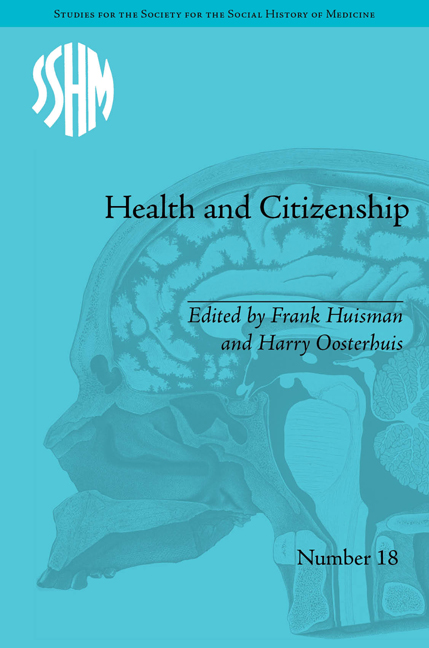Book contents
- Frontmatter
- CONTENTS
- Acknowledgements
- List of Contributors
- The Politics of Health and Citizenship: Historical and Contemporary Perspectives
- Part I Liberal Citizenship and Public Health
- Part II Social Citizenship: Health in the Welfare State
- Part III Neo-Republican Citizenship: Health in the Risk Society
- 8 Neo-Republican Citizenship and the British National Health Service since 1979
- 9 Struggling with Science and Democracy: Public Health and Citizenship in the Netherlands
- 10 Underwriting Citizenship: The Introduction of Predictive Medicine in Private Insurance
- Notes
- Index
8 - Neo-Republican Citizenship and the British National Health Service since 1979
from Part III - Neo-Republican Citizenship: Health in the Risk Society
- Frontmatter
- CONTENTS
- Acknowledgements
- List of Contributors
- The Politics of Health and Citizenship: Historical and Contemporary Perspectives
- Part I Liberal Citizenship and Public Health
- Part II Social Citizenship: Health in the Welfare State
- Part III Neo-Republican Citizenship: Health in the Risk Society
- 8 Neo-Republican Citizenship and the British National Health Service since 1979
- 9 Struggling with Science and Democracy: Public Health and Citizenship in the Netherlands
- 10 Underwriting Citizenship: The Introduction of Predictive Medicine in Private Insurance
- Notes
- Index
Summary
The British National Health Service (NHS) was created by the Labour government under the Minister of Health, Aneurin Bevan in 1948. It is generally classified as a ‘Beveridge’ as opposed to a ‘Bismarck’ health care system: state-owned and tax-funded, rather than insurance based, offering health care free at the point of use to all. Unlike some of the Nordic and Southern European state systems, it is based on central rather than local government and local administrative bodies tend to be appointed rather than elected, with the centre having top-down authority over local bodies. At first sight the principles of the NHS – comprehensive, universal and free care that is provided equally to all – appears to fit well with citizenship. Many arguments link social democratic or Marshallian citizenship to the welfare state. For example, according to Gosta Esping-Andersen, ‘Few can disagree with T. H. Marshall's proposition that social citizenship constitutes the core idea of a welfare state’ and ‘the outstanding criterion of social rights must be the degree to which they permit people to make their living standards independently of pure market forces’. As the NHS is often seen as the centre-piece of the welfare state, it has been claimed that it represents social-democratic citizenship. There are many linkages of citizenship to health care and to the NHS.
- Type
- Chapter
- Information
- Health and CitizenshipPolitical Cultures of Health in Modern Europe, pp. 177 - 190Publisher: Pickering & ChattoFirst published in: 2014



